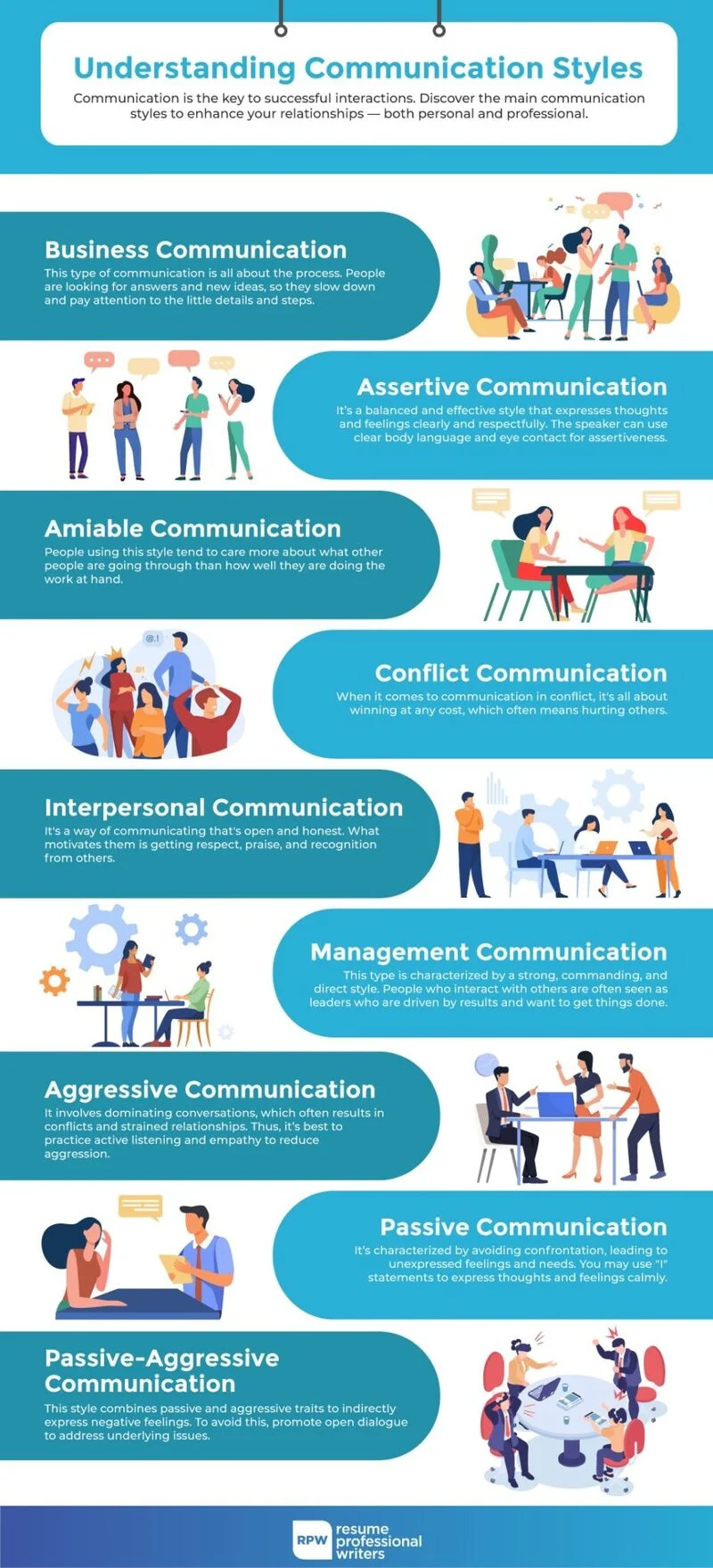Effective communication goes beyond wisely and carefully choosing your words. It also encompasses comprehensively grasping and embracing various communication styles. By understanding the characteristics and functions of a communication style, we could promote a positive workplace culture where everyone in a team motivates each other for common goals and is productive in adapting to the team’s needs.
In everyday office scenarios, conflicts normally arise. For example, one member doesn’t agree with the employee’s explanation of their work performance. Or a co-worker may simply nod, seemingly in approval, while harboring resentment deep inside. In these instances, how can knowing communication styles help you navigate different situations?
Let’s cut to the chase and delve into this article. We’ll go through the definition of communication style, the types of communication styles, the communication styles in the workplace, the effective ones to apply, and how all these can help you in your career. Read on.

What is Communication Style?
Communication styles are referred to as different approaches to communication, or the process of expressing and absorbing ideas and viewpoints. Being aware of how to communicate effectively can be more seamless if you grasp not only your communication style, but also those of your colleagues and other professionals.
Types of Communication Styles
Your communication style affects all of your interpersonal relationships as well as how you speak, behave, and react to certain situations. Here are some of the communication styles:
1. Business Communication Style
These kinds of communications are process-oriented. While searching for answers and fresh ideas, interlocutors slow down and pay close attention to the small print and processes.
Example: The head of pediatrics discusses a patient's condition with a pediatrician, seeking details from the mother. The head takes longer to identify important triggers for the patient's condition.
2. Assertive Communication Style
The most natural and effective communication style you may choose is the aggressive approach, which springs from self-esteem. The capacity to speak directly and successfully without using passive-aggressiveness or manipulation distinguishes assertive communicators from those who are either overly passive or overly aggressive. Additionally, aggressive communicators respect both their own demands and rights as well as those of other individuals. In most professional situations, this manner of communication is advised.
Example: The app developer’s music is causing difficulty for customer service agents to focus on addressing recent user issues. A customer service agent tells said app developer to turn off the music or simply wear headphones.
3. Amiable Communication Style
This type of communication employs a supportive and covert communication approach. The emotions of the people they are talking with are typically more important to them than the success of their work. They typically eliminate conflict and love interpersonal connections.
Example: The CTO requests a full-stack software developer to modify the time zone converter app's sorting feature to sort cities by geographic location, highlighting advantages and requesting an ideal timeline for approval.
4. Conflict Communication Style
Communication in conflict is centered on winning at all costs, which frequently implies wounding other people. Communicators frequently behave as though they are more entitled and capable of contributing than others. Because of the careless way they give the information, the significance of what they are attempting to say may be eclipsed.
Example: A sales team member with a conflict communication style exclaims at his teammate during a heated conversation about product analytics, “You’re wrong! The figures don’t indicate that at all!”
5. Interpersonal Communication Style
It is a type of communication that is supportive and straightforward. The respect, compliments, and recognition they may receive from others are their primary motivators. Communicators frequently have a nice, upbeat effect on others and stimulate them. Their actions typically involve a hankering for relationships and human contact.
Example: To handle their first ticket, the customer care director is looking for a fresh specialist with an interpersonal communication style. They applaud the specialist's handling of their first ticket, give thorough descriptions of required processes and performance measures, and deliver onboarding paperwork so the specialist can access their responsibilities.
6. Management Communication Style
A commanding and direct communication style defines this form of communication. Interlocutors are frequently characterized as results-driven, action-oriented leaders. They typically enjoy having control over communication, are strong leaders, and would rather take action than wait.
Example: To discuss marketing plans for the approaching period, a marketing director meets with the CEO. The director gives a step-by-step explanation, emphasizing precision and concreteness and highlighting key information for the organization's objectives.
To easily access these information, feel free to download the infographic below:

Communication Styles in the Workplace
There are numerous methods to interpret communication styles in a workplace, but today we’ll concentrate on the following:
The Analytical Communicator
Analytical communicators are fact-driven individuals who give their work a solid foundation. They have a reputation for dependability and provide others with the data and information needed to make plans a reality. For instance, they will use consistent in-store sell-out data gathered by the sales staff rather than intuition when making sales forecasts for a new product. They are more interested in what the numbers are showing than they are in projections.
The Functional Communicator
Functional communicators value structure and simplicity. Their goal is an impressive step-by-step procedure that may be easily followed. The friend in your group who always has a trip plan, a map, and a list of nearby eateries listed by cost, popularity, and distance from your accommodation may be this person.
Although some may view this person as an inflexible elderly person who can’t adapt, they are essential to the smooth operation of any system. Because they are in charge of the situation, they make it simpler for others to take it easy.
The Intuitive Communicator
The world’s big-picture thinkers are intuitive communicators. They enjoy skipping ahead to the end result. They give your project meaning. Idealists and creatives frequently communicate intuitively. They are more concerned with their goals than the details of the contract.
They are known as great leaders who intuitively communicate, inspire us, and keep us focused on our goals and beliefs. Their willingness to learn through experience is frequently what you need to get things started.
The Personal Communicator
A personal communication style is distinguished by an emphasis on other people’s sentiments. This communication style places a strong emphasis on diplomacy, interpersonal awareness, and maintaining coworker harmony.
They are crucial in assisting their coworkers in achieving their shared objectives because they are frequently regarded as the heart and soul of a project. Paradoxically, this contributes to the goals’ achievement because they frequently care more about their coworkers’ welfare than the goals themselves. After all, a productive team is one that is healthy and content.

Effective Communication Styles
To be aware of how you should communicate appropriately, here are some of the effective communication styles:
Passive
Most passive communicators hold back and don’t make a lot of eye contact. During discussions, they could appear uninterested and hardly ever take a stand or speak up for themselves. It could be challenging to discern whether they are uncomfortable or require assistance with a crucial endeavor because they don’t frequently communicate their demands or express their emotions.
Aggressive
The views and sentiments of aggressive communicators are constantly expressed, and they frequently dominate discussions at the expense of others. They might also behave without first thinking, which can harm relationships and reduce productivity at work. In some leadership contexts, an aggressive communication style may be respected, but it can be terrifying to individuals who respond better to a calmer style.
Passive-Aggressive
Passive-aggressive communicators appear peaceful on the outside, but their actions frequently reveal more aggressive goals. They frequently contradict themselves in their behavior, despite the fact that they may appear lovely in their words. They have the capacity to subtly sway events in their favor.
Assertive
The most courteous and effective kind of communication at work is often forceful. Assertive communicators freely share their opinions while always being respectful and polite. They gladly accept challenges but are also capable of saying “no” when necessary. These people are aware of their own boundaries and respect them without becoming unduly combative or defensive.
Why are Communication Styles Important?
People who communicate in different ways are more likely to encounter conflict or miscommunication. It can be easier to engage with people who have diverse communication styles when we are aware of their traits and tendencies.
Additionally, factors such as cultures and contexts may have different expectations for communicative styles. That’s why being aware various communication styles — and being respectful of these — can help to facilitate more effective communication.

Level Up Your Interview Responses with Professional Resume Writers
Each individual certainly has a unique communication style, so it is essential to accurately identify and understand. When you successfully transition into each style, you will be better equipped to work professionally.
All this begs the question: how do we execute the right communication skills during our scheduled job interview? You may be a job seeker who wants to advance their career. Whatever the case, effective communication skills and styles are needed. Resume Professional Writers’ career development specialists can elevate your interview responses through their industry expertise and their top-notch opening statements in job interviews. With this job search tool, you can grab the interviewer’s attention from the get-go! Inquire now.








